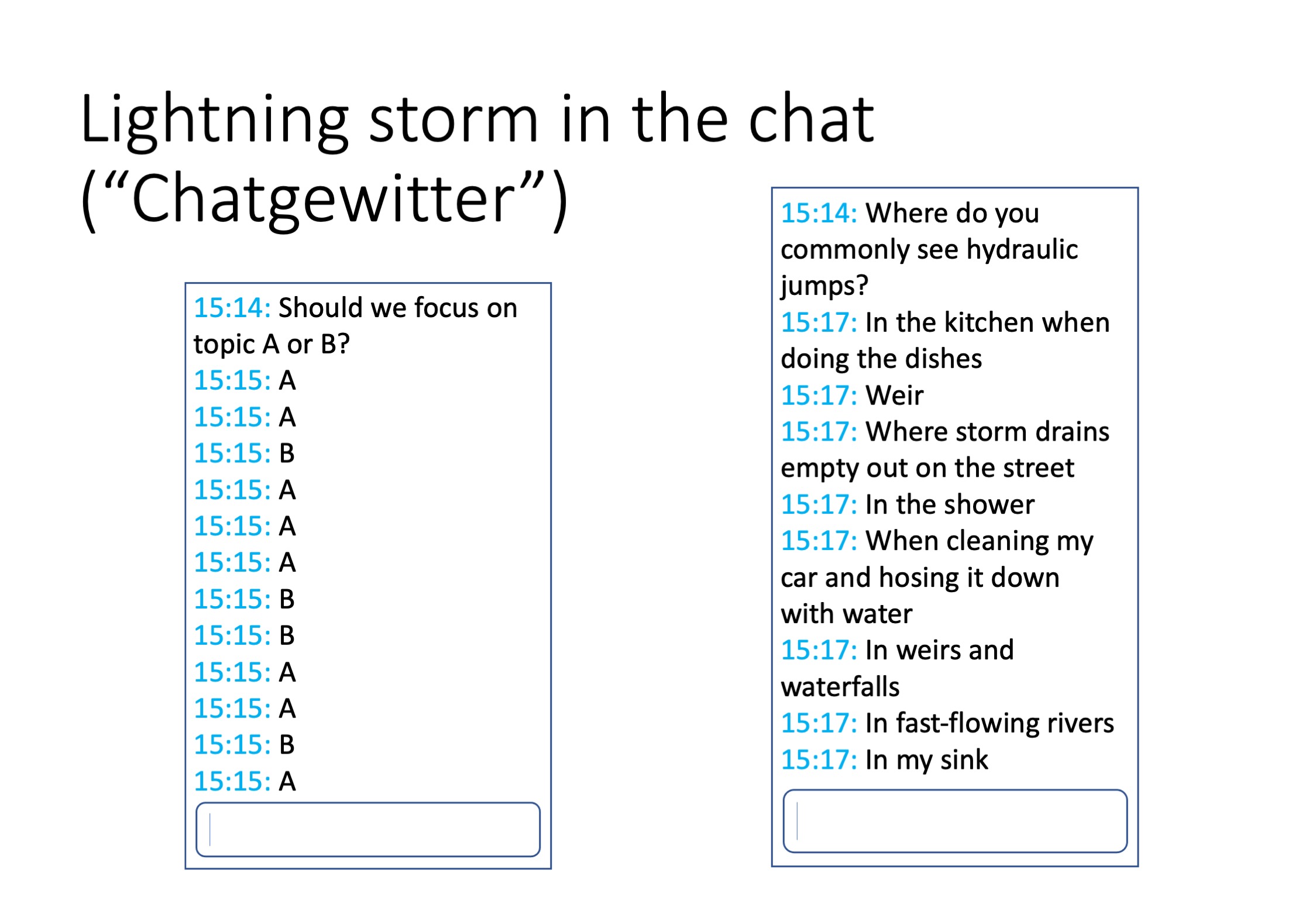
The “lightning storm in the chat” method
In a workshop I led recently, a participant helped me gain a new perspective on an old method: the “lightning storm in the chat” (my best attempt at translating “Chatgewitter” to English. No idea what the name of the method is in English).
The idea is simple: You ask a question, people type their responses in the chat, but they don’t send them just yet. After either a fixed time or a short countdown, everybody presses enter simultaneously, and all the answers appear in the feed at the same time.
I’ve always seen this used as ice breaker question (“what kind of drink do you have on your desk right now?”, “what’s your favourite pet?”, or similar “ice-breaking” questions) and I always thought it was a typical example of a method that was just being used because we always learn that we should occasionally change methods, but that didn’t actually do much except waste time (which, btw, is a common perception of multiple choice questions, too, which I always counter with “well, maybe you need to ask better questions”…).
But obviously, the same “lightning storm in the chat” method can be used with better — open, deeper, more interesting — questions, too, and then goes from being a silly waste of time to a useful tool:
- Since everybody types at the same time, this method is a lot faster than the typical methods of collecting input, where one person responds, and then the next one responds, and so on. Now we just need to give a minute or two (or five) to think and type, and then all the answers are ready to be submitted.
- Since we are collecting all the different answers within a matter of minutes, it is actually feasible to get an answer from everybody in the audience. This would most likely not be possible if we were relying on people to verbally communicate their answers.
- Since a lot of answers appear at the same time, it takes pressure and importance off of each individual response. Each response still contributes to the overall picture, but in the end, it is just one of many. This makes the threshold a lot lower than if people were responding one at a time.
- When participants respond one after the other, responses are inevitably biased by what was said before. Not with this method: we get a good impression of what people are thinking individually, pre-discussion. (This can be helpful for assigning people into groups for discussion later on, too!)
- In contrast to multiple-choice questions with pre-defined answers, we are also not missing out on nuances in the responses when someone mostly agrees with an answer, but not quiiite, but has no way of indicating that in a classical multiple-choice choice (well, we are still missing nuances here, too, since we are still typing under time pressure, but you get my point)
- Also in contrast to multiple-choice questions, there is hardly any preparation going into it. Questions can be asked spontaneously when the need arises. (Obviously, for the purpose of optimally supporting learning it still makes sense to think about questions a little, and not just rely on spontaneous intuition as a default…)
- Since there are no pre-defined answer options, this is a great tool to ask e.g. for suggestions on how to proceed, what kind of topic would be interesting to discuss, or other really open questions that can help the instructor understand what the participants want or need at that time.
Have you used the “Chatgewitter” method before? What do or don’t you like about it?
#Methods2Go: Methods for feedback and reflection in university teaching - Adventures in Oceanography and Teaching says:
[…] kind of thing because on the pressure I felt in those situations. But virtually, fo example as a lightening storm in the chat, I rather like the method because it gives an equal voice to everybody instead of a few people […]
Ib says:
You can translate it as thunderstormchat or just chatstorm (not shitstorm!)…